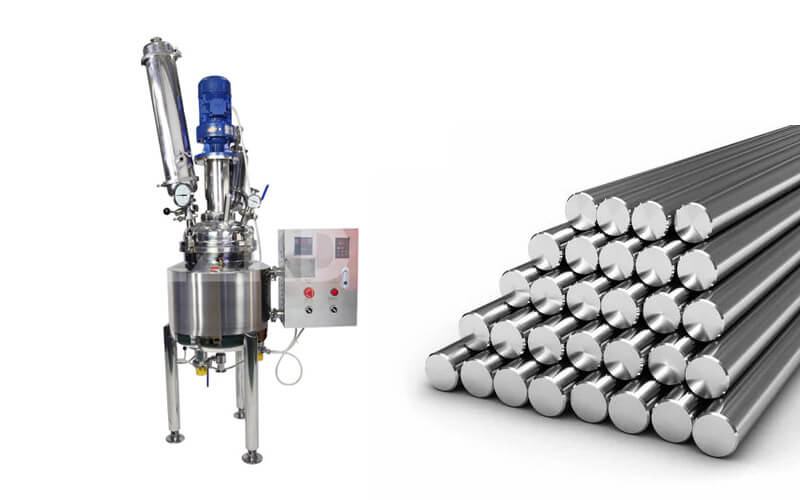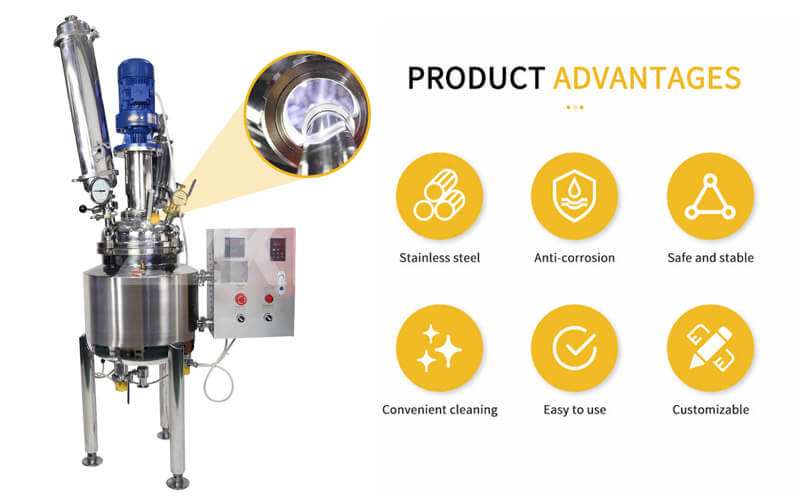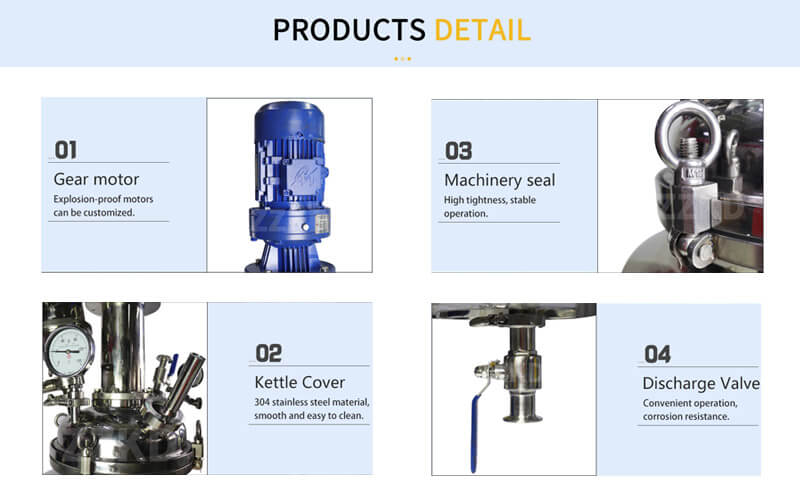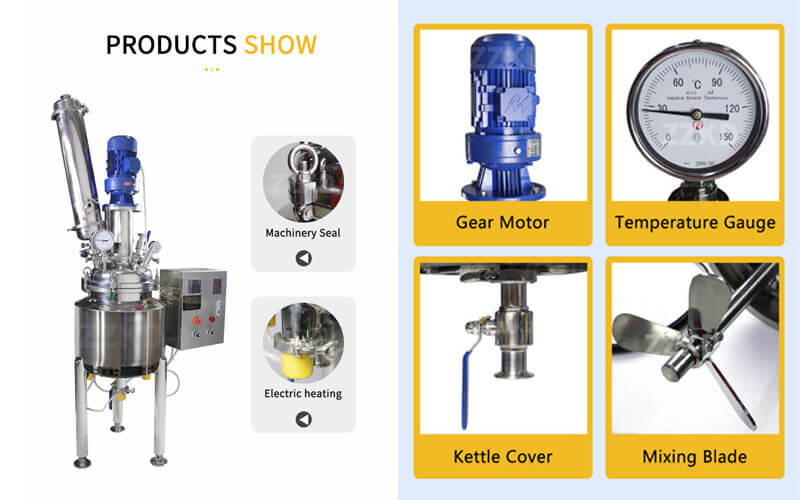Stainless steel reactors stand as the pinnacle choice in numerous industries, from pharmaceuticals and chemicals to food and beverage processing. But what sets them apart? Why do professionals overwhelmingly prefer stainless steel over other materials? This article explores the myriad advantages of stainless steel reactors, shedding light on why they reign supreme in various industrial applications.
1. Corrosion Resistance
Stainless steel reactors boast exceptional resistance to corrosion, a trait attributed to their chromium content. Chromium forms a passive layer of chromium oxide on the surface, acting as a shield against corrosion even in the most hostile environments. From acidic to basic to saline conditions, stainless steel reactors endure without degradation, ensuring reliability and longevity.
Have you ever experienced equipment failure due to corrosion? How much time and money could have been saved by utilizing stainless steel reactors?
Yes, as an equipment supplier and industry expert, I’ve witnessed instances of equipment failure attributed to corrosion. By incorporating stainless steel chemical reactors, companies could potentially save significant time and financial resources by avoiding frequent repairs and replacements, thus enhancing operational efficiency and profitability.

2. Durability and Longevity
The strength and durability of stainless steel reactors are unparalleled. They can withstand high pressures and temperatures, making them suitable for the most demanding processes. Unlike other materials that may deteriorate over time, stainless steel maintains its integrity, offering an extended service life. This durability translates to lower maintenance costs and fewer replacements, providing a significant economic advantage.
3. Hygienic Properties
In industries such as pharmaceuticals and food processing, hygiene is paramount. Stainless steel’s non-porous nature and ease of cleaning prevent the buildup of bacteria and contaminants. It meets stringent hygiene standards and is often mandated for processes where cleanliness is critical. The smooth, polished surface of stainless steel reactors facilitates easy sterilization, ensuring an uncontaminated production environment.
How crucial is hygiene in your production process? Could transitioning to stainless steel enhance your product quality?
Hygiene plays a paramount role in the production processes of various industries, including pharmaceuticals and food processing, where product purity is non-negotiable. From my professional standpoint, transitioning to stainless steel chemical reactors could indeed elevate product quality by ensuring a sterile manufacturing environment, ultimately meeting stringent regulatory standards and bolstering consumer confidence in the final products.

4. Thermal Conductivity
Stainless steel boasts excellent thermal conductivity, essential for reactors in temperature-sensitive processes. It allows for precise temperature control, vital in chemical reactions and pharmaceutical manufacturing. This property ensures even heat distribution, preventing hotspots that could compromise a batch or pose safety risks.
5. Versatility
Stainless steel reactors come in various sizes and configurations, making them highly adaptable for diverse applications. Whether you require a small reactor for laboratory research or a large-scale unit for industrial production, stainless steel can be tailored to your specific needs. This versatility extends to reactor design, which can incorporate features such as heating/cooling jackets, agitation systems, and pressure controls.
6. Environmental Benefits
Stainless steel is 100% recyclable, making it an environmentally friendly choice. At the end of its lifecycle, a stainless steel reactor can be recycled and repurposed, reducing the demand for raw materials and minimizing environmental impact. By opting for stainless steel, companies can bolster their sustainability initiatives and contribute to a circular economy.

7. Economic Efficiency
While the initial cost of stainless steel reactors may be higher than that of other materials, the long-term economic benefits are substantial. The durability, low maintenance requirements, and extended lifespan of stainless steel reactors result in a lower total cost of ownership. Additionally, their ability to operate efficiently under high-stress conditions reduces downtime and enhances productivity, further bolstering economic efficiency.
8. Chemical Compatibility
Stainless steel is compatible with a wide range of chemicals, making it ideal for reactors in the chemical industry. It does not react with most chemicals, preventing contamination and ensuring product purity. This chemical resistance also enables stainless chemical steel reactors to handle aggressive reactions that might damage equipment made from less robust materials.
Are you currently using materials that react with your chemicals? How could stainless steel improve your production process?
The presence of materials prone to chemical reactions can indeed pose challenges to the smooth functioning of production processes. From my professional standpoint, stainless steel reactors offer a compelling solution to this issue. By leveraging the exceptional chemical compatibility of stainless steel, companies can minimize the risk of contamination and optimize their production processes. This not only enhances operational efficiency but also contributes to maintaining product quality and consistency, thereby meeting regulatory standards and customer expectations.
9. Safety
Safety is paramount in any industrial setting. Stainless steel reactors are designed to withstand high pressures and temperatures, mitigating the risk of accidents. The strength and integrity of stainless steel ensure that reactors can operate safely under extreme conditions, safeguarding both personnel and equipment.

Stainless steel reactors offer a plethora of benefits that make them the top choice across various industries. From unmatched corrosion resistance and durability to hygienic properties and economic efficiency, stainless steel chemical reactors provide a reliable and versatile solution for many industrial processes.
If you’re considering upgrading your equipment or embarking on a new project, stainless steel reactors could be the key to enhancing your production capabilities. They not only meet but often exceed industry standards, ensuring smooth, efficient, and safe operations.
So, why hesitate? Evaluate your current equipment and contemplate how stainless steel reactors could revolutionize your production processes, elevate your product quality, and bolster your bottom line. Investing in stainless steel isn’t just a purchase; it’s a strategic move toward long-term success.
